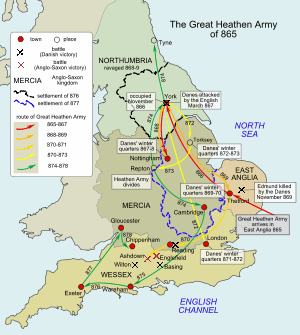865
Year 865 (DCCCLXV) was a common year starting on Monday (link will display the full calendar) of the Julian calendar.
| Millennium: | 1st millennium |
|---|---|
| Centuries: | |
| Decades: | |
| Years: |
|
| 865 by topic |
|---|
| Leaders |
| Categories |
|
| Gregorian calendar | 865 DCCCLXV |
| Ab urbe condita | 1618 |
| Armenian calendar | 314 ԹՎ ՅԺԴ |
| Assyrian calendar | 5615 |
| Balinese saka calendar | 786–787 |
| Bengali calendar | 272 |
| Berber calendar | 1815 |
| Buddhist calendar | 1409 |
| Burmese calendar | 227 |
| Byzantine calendar | 6373–6374 |
| Chinese calendar | 甲申年 (Wood Monkey) 3561 or 3501 — to — 乙酉年 (Wood Rooster) 3562 or 3502 |
| Coptic calendar | 581–582 |
| Discordian calendar | 2031 |
| Ethiopian calendar | 857–858 |
| Hebrew calendar | 4625–4626 |
| Hindu calendars | |
| - Vikram Samvat | 921–922 |
| - Shaka Samvat | 786–787 |
| - Kali Yuga | 3965–3966 |
| Holocene calendar | 10865 |
| Iranian calendar | 243–244 |
| Islamic calendar | 250–251 |
| Japanese calendar | Jōgan 7 (貞観7年) |
| Javanese calendar | 762–763 |
| Julian calendar | 865 DCCCLXV |
| Korean calendar | 3198 |
| Minguo calendar | 1047 before ROC 民前1047年 |
| Nanakshahi calendar | −603 |
| Seleucid era | 1176/1177 AG |
| Thai solar calendar | 1407–1408 |
| Tibetan calendar | 阳木猴年 (male Wood-Monkey) 991 or 610 or −162 — to — 阴木鸡年 (female Wood-Rooster) 992 or 611 or −161 |

A map of the Viking invasion in East Anglia with the routes of the Great Heathen Army.
Events
By place
Europe
- King Louis the German divides the East Frankish Kingdom among his three sons. Carloman receives Bavaria (with more lands along the Inn River). He gives Saxony to Louis the Younger (with Franconia, and Thuringia) and Swabia (with Raetia) to Charles the Fat. Louis arranges marriages into the local aristocracy, for his sons to hold important territories along the frontiers.
- King Lothair II, threatened with excommunication, takes back his first wife, Teutberga. She expresses her desire for an annulment, but this is refused by Pope Nicholas I.
- Boris I, ruler (knyaz) of the Bulgarian Empire, suppresses a revolt, and orders the execution of 52 leading boyars, along with their whole families.
Britain
- The Great Heathen Army (probably no more than 1,000 men) of Vikings, led by Ivar the Boneless and Halfdan Ragnarsson, invades East Anglia. King Edmund of East Anglia buys peace with a supply of horses.
- Viking king Ragnar Lodbrok is captured by the Northumbrians in battle, and killed by being thrown into a pit filled with poisonous snakes, on the orders of King Ælla of Northumbria.
- Autumn – King Æthelberht of Wessex dies after a 5-year reign, and is buried at Sherborne Abbey (Dorset). He is succeeded by his brother Æthelred I, as ruler of Wessex.
Abbasid Caliphate
- Caliphal Civil War: An armed conflict starts between the rival Muslim caliphs al-Musta'in and al-Mu'tazz. They fight to determine who takes control over the Abbasid Caliphate (until 866).
By topic
Religion
- Kassia, a Byzantine abbess and hymnographer, dies. She is one of the first Early Medieval composers of many hymns.
Births
- Al-Nayrizi, Persian mathematician (d. 922)
- Baldwin II, Frankish margrave (approximate date)
- Jinseong, queen of Silla (approximate date)
- Lady Ren Neiming, Chinese noblewoman (d. 918)
- Louis III, king of the West Frankish Kingdom (or 863)
- Simeon I, ruler (khan) of the Bulgarian Empire (or 864)
Deaths
- February 3 – Ansgar, Frankish monk and archbishop (b. 801)
- March 8 – Rudolf of Fulda, German theologian
- November 11 – Petronas, Byzantine general
- December 26 – Zheng, empress of the Tang Dynasty
- Æthelberht, king of Wessex
- Antony the Younger, Byzantine governor and saint (b. 785)
- Deshan Xuanjian, Chinese Zen Buddhist monk
- Gao Qu, chancellor of the Tang Dynasty
- Kassia, Byzantine abbess and hymnographer
- Khurshid, ruler (shah) of Daylam
- Liu Gongquan, Chinese calligrapher (b. 778)
- Lothair the Lame, Frankish abbot
- Muhammad ibn al-Fadl al-Jarjara'i, Muslim vizier (or 864)
- Pepin II, king of Aquitaine (approximate date)
- Ragnar Lodbrok, king of Denmark and Sweden
- Raymond I, count of Toulouse
- Rorgon II, count of Maine (approximate date)
- Tigernach mac Fócartai, king of Lagore (Ireland)
- Wenilo, Frankish archbishop
- Xiao Zhi, chancellor of the Tang Dynasty
- Yahya ibn Umar, Muslim imam (or 864)
gollark: What do you other people use for display managers or whatever they are? Desktop managers? I seem to have forgotten.
gollark: I had just mixed up `map` and `and_then` somewhere, but it was... far too hard to figure that out.
gollark: I also used `warp` in Rust once... the type errors were *horrible*. They were several lines filled with dense crazy generics.
gollark: Kind of? I mean, I find those easier to debug, possibly just due to greater exposure.
gollark: Anyway, I remember working on this, and spending most of the time on it just debugging unintuitive type errors.
References
This article is issued from Wikipedia. The text is licensed under Creative Commons - Attribution - Sharealike. Additional terms may apply for the media files.